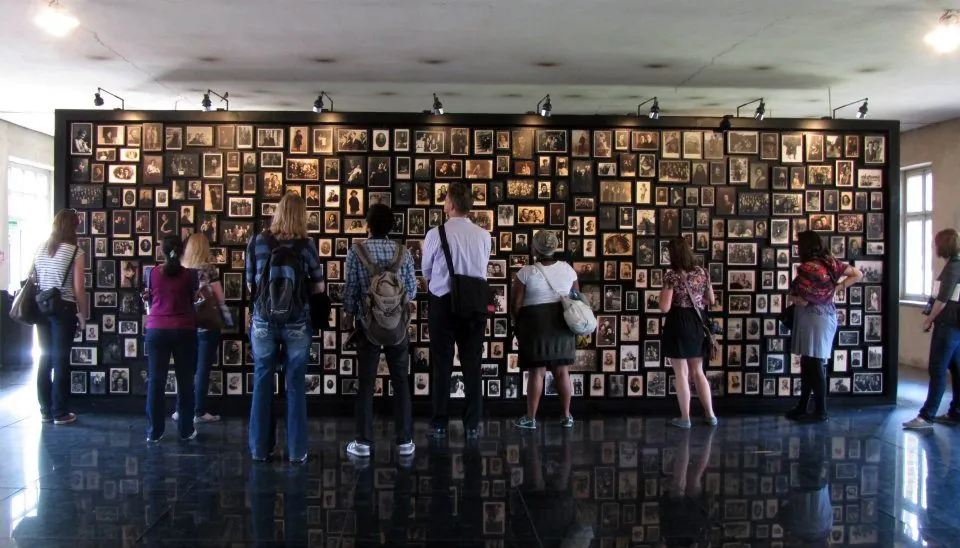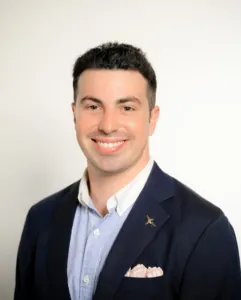

A group of FASPE Fellows visits the Birkenau Museum to view the photos of men, women and children who were prisoners at Nazi German concentration and extermination camp Auschwitz.
MBA students usually discuss business ethics in a staid classroom setting, exploring cases like Enron or other headline-worthy examples of corporate fraud. The increasingly distant time period in which the Holocaust took place — rife with searing ethical questions and thorny business dilemmas confronted by industry leaders in Germany and Poland in the mid-20th century — does not typically show up in MBA curricula.
But in a few weeks, a small group of MBA students and recent graduates from elite business schools will join a few early-career professionals on a flight to Germany and Poland, beginning a fellowship that will include two weeks as ethics detectives, reflecting on the lessons of the Holocaust — and the often co-dependent relationships between the Nazis and business leaders of the time.
On the itinerary: The villa in the Berlin suburb of Wannsee where Nazi middle managers and German government officials convened in 1942 to discuss and coordinate plans for the Nazis’ Final Solution to annihilate Europe’s Jewish population. The group also will visit the Brandenburg “Euthanasia” Center and the Topography of Terror, a history museum in Berlin — and the trip will culminate in a visit to Auschwitz, the former German Nazi concentration and extermination camp, where 1.1 million perished during World War II.
FELLOWSHIPS OFFER A FRESH WAY TO LOOK AT BUSINESS ETHICS
Rebecca Scott, program director of the Fellowships at Auschwitz for the Study of Professional Ethics (FASPE), the nonprofit sponsoring the trip, says it’s tempting to describe the trip as Holocaust education, or a genocide prevention program. But that would be missing the point.
“We’re using the past as a lens to really consider contemporary professional ethics,” Scott says.
The FASPE Fellowship began as a pilot program in the summer of 2009 for law and medical fellows, and has since expanded to include those in the fields of business, design and technology, and seminary; its Business Fellows program was introduced in 2015. It has evolved into one of the leading ethics programs for graduate students and young professionals embarking on their careers, giving out 80 to 90 fellowships annually. Students on the trip engage in daily seminars and visit sites of historic importance, sometimes specific to their profession.
FASPE aims to take the lessons of the Holocaust and both memorialize and reframe them in a way that resonates with a younger generation grappling with its own unique ethical challenges in the workplace, organizers say.
“It is super important to carry forward the lessons of the Holocaust, but we want our fellows to come out of the program with a deeper sense of ethical reflection,” Scott says. “If we dig into history, we can see that these were pretty ordinary people making these decisions who were often not driven by ideology.”
A ‘LIFE-CHANGING’ EXPERIENCE


Mendoza’s Ann Tenbrunsel: “We are taking a group of people that are really interested in ethical behavior and showing them how organizations, systems and individuals themselves can be led astray.”
This year, there will be 14 Business Fellows on the trip, a diverse group of young professionals and MBA students from such schools as The Wharton School at the University of Pennsylvania, Harvard Business School, and Duke University’s Fuqua School of Business. They’ll be traveling alongside Law and Design & Technology Fellows, and as a group will share how ethical norms may differ in their respective fields, Scott says.
This year, FASPE’s Business Fellows program will be led by Max Bazerman, a professor of business administration at Harvard Business School, and Ann Tenbrunsel, a professor of business ethics at the University of Notre Dame’s Mendoza College of Business.
Tenbrunsel, joining the trip for the first time this year, says she expects it to be a “life-changing” experience — for herself and the fellows.
“We are taking a group of people that are really interested in ethical behavior and showing them how organizations, systems and individuals themselves can be led astray,” she says.
“To work with people like that and to really try to educate and motivate the next generation was super compelling to me.”
FELLOWS WANT TO PRIORITIZE ETHICS IN THEIR CAREERS
Kandasi Griffiths, a 2024 fellow who just graduated from Duke’s Fuqua School, decided to apply for the FASPE Fellowship because she has continuously been frustrated by the tricky intersection of ethics in the global health programs and the social impact investing field. A self-described “Model UN nerd” from her high school days, Griffiths has devoted her life to improving global health for women and children in West Africa, and started her own consultancy dedicated to helping women of color scale impact ventures.
As she prepares to start her post-graduation job at Social Finance, an investing and impact advisory nonprofit, she wanted to make sure she had the framework to make both financially and ethically sound decisions.
“No matter what field we’re going into, having an MBA has a lot of privilege and a lot of power,” she says. “I wanted to have the tools to bring these difficult conversations up in the workplace, like how do you make a system that’s fair but also equitable and can prioritize those who haven’t been able to get funding before.”


FASPE 2024 Business Fellow Julian Gluck: “Coming from combat aviation and the uniformed service, ethics is vitally important to me.”
Joining her on the trip is Julian Gluck, a U.S. Air Force Academy graduate finishing up his first year as an MBA student at Harvard Business School. He will be interning at McKinsey’s London office this summer, and also serves in the U.S. Air Force Reserve.
During his time as an active-duty B-52 bomber pilot, he flew combat missions in Iraq, Syria and Afghanistan, and was also deployed to the Indo-Pacific region.
“Coming from combat aviation and the uniformed service, ethics is vitally important to me,” Gluck says.
He expects the program to be a transformative experience for him partly for personal reasons: Half of his family emigrated from Central Europe in the late 19th and early 20th centuries to escape persecution and to find a better life in the U.S. He’s also looking forward to taking a deep dive into ethics by analyzing how business decisions were made by leaders in the mid-20th century.
Says Gluck: “It’s going to be a very powerful lesson on the agency of leaders in industry, the inseparable links between the public and the private, government and commerce, and the responsibilities that we all have to make more moral choices for ourselves, our employers our shareholders and our communities.”
CASE STUDIES ON COMPANIES COMPLICIT IN HOLOCAUST ATROCITIES
Indeed, business leaders at the time played a pivotal role in helping the Nazi regime achieve its goals of the so-called “Final Solution.” German businesses were involved in arms manufacturing for the Nazis, while major banks helped transfer Jewish assets into German hands.
One of the examples discussed on previous trips is the Topf Corporation case study, which looks at how a German corporation, Topf and Sons, built the crematorium ovens for most of the major concentration camps in Germany.
Mendoza’s Tenbrunsel says she expects to talk with students about the justifications that business leaders at the time used to distance themselves from the human toll their decisions had on the Jewish people and other populations. In a class she teaches at Mendoza, The Foundations of Ethical Business Conduct, she often brings up the example of Albert Speer, Hitler’s personal architect, who convinced himself that because he was an administrator for Hitler “the issues relating to the human beings were not part of his responsibility,” she says.
“That quote of his has really resonated with my students,” she says. “It is easy for them to see how even in organizations, we may compartmentalize functions or jobs that could lead me to not seeing the whole picture, or at least allow me the justification that I’m not responsible for a certain piece of this.”


FASPE Fellows visit the train tracks where tens of thousands of Jews from Berlin were deported to concentration camps.
A LIFE-LONG COMMUNITY FOCUSED ON ETHICS
FASPE Business Fellow Nina Bondre, a soon-to-be graduate of Wharton’s MBA program, is a Certified Prosthetist Orthotist, and throughout her career has seen up close the many inequities in the U.S. healthcare system, she says. Before business school, she worked as a clinical educator in her field, and after graduating from Wharton will be part of the leadership development rotation program at Medtronic, a medical device company.
“My personal challenge will be how do we do what’s best for the patient, but also have an operational and healthy business the day after that so we can keep seeing those patients,” she says.
Her goal: To improve healthcare for underserved populations by serving as a bridge between clinics and corporations. She believes having a strong ethical compass will be essential for that type of role, and any ethical conflicts that may arise in her post-MBA role.
“I want to use my FASPE experience to develop those skills and have this community of people that are also interested in these topics and can help me navigate these situations,” she says.
A THRIVING ALUMNI COMMUNITY
When her FASPE Fellowship is over, Bondre said she looks forward to joining the active alumni community of past FASPE Fellows around the world
There are over 830 FASPE Fellows around the world, a number that grows with each group of 80-90 Fellows selected each year. About 150 attend FASPE’s annual alumni reunion, and many stay in touch online, says FASPE’s Scott.
The program has long-lasting benefits for those who participate, according to a survey of FASPE’s vast alumni network. The survey showed that 90% of the survey participants agreed that their fellowship experience made them consider ethical considerations in their day-to-day decisions, while 84% reported that after their fellowship, they initiated conversations about ethics with their peers or colleagues.
This is ultimately the goal of the program, to build a like-minded community of professionals who prioritize and think critically about ethics in the workplace, Scott emphasizes.
“It’s not just a two-week trip,” says Scott. “We want to build this community and this professional network that people can then rely on throughout the course of their careers.”
DON’T MISS: IN DEMAND, BUSINESS ETHICS COURSES and CAN ETHICS BE TAUGHT?
link






More Stories
Business Ethics for Better Behavior, By Jason Brennan, William English, John Hasnas, and Peter Jaworski
Corporate Ethics & Sustainability Now Key Factors Driving Job Decisions For Business School Students
Local students participate in state FBLA conference | News, Sports, Jobs